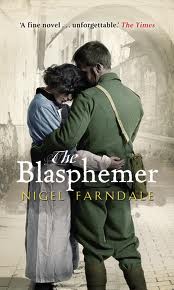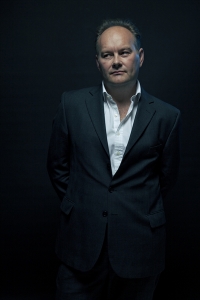Folding in on Oneself:
The Blasphemer

“I believe in a sort of life after death. We live on in the memories of the people who loved us, our wives and husbands, our friends, our children and, if we are lucky, our grandchildren. In that way we live on, for a generation or two at least, then we fade, become those old sepia photographs which no one knows what to do with because no one can identify the faces”.
—from The Blasphemer.
It’s really rather an odd one, this book. Despite the multiplicity of characters and themes it does grip and it certainly kept this reader, at least, turning the pages. In fact, despite—or because of– the fact that one of those themes concerns whether or not life goes on after death and another deals with Evolution versus Creationism, both weighty subjects, I actually went through it in just two days. Although in fairness that meant a couple of really late nights. Thank God for insomnia.
And there’s a sentiment that you wouldn’t want to mumble even innocently in front of Daniel Kennedy, one of the main characters in Nigel Farndale’s 2010 novel The Blasphemer. Daniel, you see, is not only a zoologist and Darwinian Rationalist, he is also an atheist. And when I say ‘atheist’ I don’t mean the kind of Doubting Thomas that I myself am. As far as I’m concerned it’s unlikely that there is any kind of God that is represented by any of the major or even minor religions; and as a matter of fact I don’t lose a lot of sleep over it. I’m going to find out soon enough, that’s for sure. Or not, depending on whether I wake up anywhere else. There’s not a lot I can really do about it.
No, Daniel is one of those hardcore, kick-them-in-the-nuts, Richard Dawkins types who think that if you have any kind of belief at all then you are as thick as pig-shit. Personally, as they begin to profligate, I’m finding this new breed of militant atheist as fundamentalist in their own narrow way than any mad Muslim or Catholic. Indeed, I’m beginning to find them complete spoilsports for the way in which they suck all the magic out of life. Daniel himself has a precocious and annoying nine-year-old daughter as the novel begins but she has long ago been told that Santa Clause is just a daft myth. I mean, even I don’t do things like that.
It’s because of this intransigence that he has never married his long-time partner Nancy. However, as we join this bag of fun he is about to take her on a surprise trip to the Galapagos Islands where he intends to lighten up a bit by proposing to her. It’s not meant to be, however. Before they can touch down the plane crashes into the ocean and in a life-defining moment, as the plane flounders in the Pacific, Daniel pushes Nancy out of his way in order to save his own skin.
And here is what I couldn’t quite get: this rash act of panic is to stand between them and torture both for the remainder of the book. Yet it is only a momentary weakness and Daniel almost immediately turns back in order to rescue her. Beyond that, he swims for miles to reach land and when he summons help he indeed saves most of the passengers. Yet Nancy—again, not a particularly likeable character in the first place—cuts him no slack for this whatsoever; and his act of ‘cowardice’ haunts him.
He is also haunted by something even more troubling to his atheistic sensibilities: whilst almost giving up on his heroic swim for help he appears to see a young man (who he may even have seen before they left London) who beckons him on. Is this a hallucination brought on by dehydration and exhaustion…or has he been granted an angelic vision?
Running parallel to this is the story of his great-grandfather, Andrew, who served in World War One; and this story is really quite engrossing. Andrew, too, appears to have had his life saved—or just changed?—by a familiar figure who leads him to safety past the German lines during the bloodbath of Passchendaele. Again, is this an actual vision of an Angel or something that can be explained in more prosaic terms?
Either of these two stories would be enough in themselves, considering the kind of speculation that they lead to; but Farndale doesn’t leave it there, not by a long shot. There are several other paths that he wants you to travel and in the main he is successful. One such story strand deals with Daniel’s colleague, a Professor of Music by the name of Wetherby. This is a truly despicable creature, hiding his sheer rottenness beneath a veneer of pious Catholicism. He’s not quite a pantomime villain (although there were times that I felt like shouting more than “He’s behind you” at his brilliant- yet- brainless girlfriend) but he’s pretty bad just the same. Wetherby is pursuing his own obsession: he is on the trail of an alternative opening to Mahler’s Ninth Symphony; and this ties in with the World War One story in a way that you can either think is implausible or can be put down to…well, for want of a better term, supernatural intervention—again.
The Arthur Machen Connection
An awful lot of readers seem to have found that this is a case of seriously over-egging the pudding (listen, there’s a whole major Islamic terrorist plot I didn’t even touch on); but I confess that I found it absolutely fascinating, as indeed I found almost all of this book to be. Indeed, one of my favourite sequences is at a party where Wetherby talks at length of the famous ‘Angel of Mons’ rumour that was—very unwittingly—started by that great Welsh writer of weird stories, Arthur Machen. In his short 1915 tale The Bowmen Machen had written of a divine intervention in which the tables were turned during a pivotal World War One battle. Obviously every warring side needs to think that they have God on their side. Yet the more that Machen would say unequivocally that it was just a piece of fiction the more that he was doubted. Ironically, in the canon of work from this master of the form it was one of his poorest. Perhaps God really does have a sense of humour. Whatever the truth, in terms of sheer longevity (if not influence) this has to rank with H. P. Lovecraft’s equally unwitting creation of that other enduring myth: that his fictional occult volume the Necronomicon was real. Again, despite his protestations to the contrary, you can even now visit endless websites devoted to it. There are an awful lot of mad people out there.
And in perhaps the most supreme irony of all, Arthur Machen was one of Lovecraft’s avowed inspirations.
This is where Farndale is both inventive and annoying: he will slip in something like this and then in a disconcerting twist have one of the peripheral and yet pivotal characters give the impression that it may have been real!
In terms of what is true and what is perceived from one viewpoint to be true I actually found myself wondering if the character of Wetherby had been so named as a small homage to David Hare’s mind game of a 1985 film, Wetherby. Yet there are other little inserts that just go nowhere, no matter how much you play around with them. I’m thinking here of the HP sauce labels. So: either clever or annoying, depending on the mood you’re in.
As to the writing, it is occasionally pedestrian and at other times it hits home perfectly. As with this sad passage that pretty much sums up the real horror of our modern world:
“The crowd of people choking the road bowed their heads. Three buglers in starched and colourful uniforms marched under the archway and, after the cathedral bells chimed the hour, played Last Post. A teenage girl near Daniel began rubbing her mother’s back. As the last note faded, a two-minute silence began. Partial silence. The bleeping of cameras could be heard, as well as a baby crying. After twenty seconds a mobile phone began ringing and a young and female English voice could be heard answering it—informing the caller in a loud whisper that she was at the memorial in Ypres and that she had come with her school. ‘Nah, bit boring, really.’”
Ah, but of course: the bleeping of cameras and the ringing of mobile phones: the punctuation of an entire generation with no attention spans.
And what do the many story strands and themes add up to? After the various climaxes—or anti-climaxes—I really don’t know. I’m not sure what the point was. There is even a nod to the enigma of that photograph from Stanley Kubrick’s The Shining. Or is there? Did the author have this reader wrapped up so tight that he was reading far too much into it?
In the end, if you close The Blasphemer and say that you found nothing at all to think about in it, then I suggest that whether you liked it or not, you perhaps should think of not reading any more books for a while. And I say this as someone who just did not get the ending at all.
But when I read of others who found it not only perfect but moving then you are dealing with a sensibility that is at the very least unusual. And isn’t that one of the things that we read for in the first place?
The Blasphemer by Nigel Farndale
Published by Doubleday 2010


Recent Comments